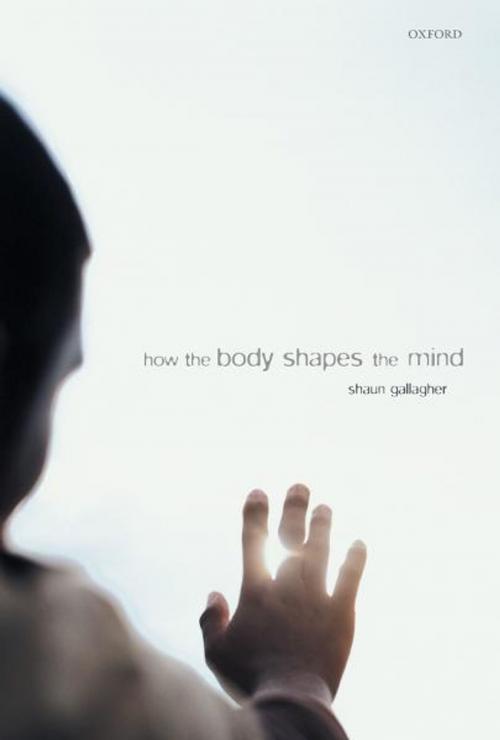How the Body Shapes the Mind
Nonfiction, Religion & Spirituality, Philosophy, Mind & Body, Health & Well Being, Psychology| Author: | Shaun Gallagher | ISBN: | 9780191622571 |
| Publisher: | Clarendon Press | Publication: | October 12, 2006 |
| Imprint: | Clarendon Press | Language: | English |
| Author: | Shaun Gallagher |
| ISBN: | 9780191622571 |
| Publisher: | Clarendon Press |
| Publication: | October 12, 2006 |
| Imprint: | Clarendon Press |
| Language: | English |
How the Body Shapes the Mind is an interdisciplinary work that addresses philosophical questions by appealing to evidence found in experimental psychology, neuroscience, studies of pathologies, and developmental psychology. There is a growing consensus across these disciplines that the contribution of embodiment to cognition is inescapable. Because this insight has been developed across a variety of disciplines, however, there is still a need to develop a common vocabulary that is capable of integrating discussions of brain mechanisms in neuroscience, behavioural expressions in psychology, design concerns in artificial intelligence and robotics, and debates about embodied experience in the phenomenology and philosophy of mind. Shaun Gallagher's book aims to contribute to the formulation of that common vocabulary and to develop a conceptual framework that will avoid both the overly reductionistic approaches that explain everything in terms of bottom-up neuronal mechanisms, and inflationistic approaches that explain everything in terms of Cartesian, top-down cognitive states. Gallagher pursues two basic sets of questions. The first set consists of questions about the phenomenal aspects of the structure of experience, and specifically the relatively regular and constant features that we find in the content of our experience. If throughout conscious experience there is a constant reference to one's own body, even if this is a recessive or marginal awareness, then that reference constitutes a structural feature of the phenomenal field of consciousness, part of a framework that is likely to determine or influence all other aspects of experience. The second set of questions concerns aspects of the structure of experience that are more hidden, those that may be more difficult to get at because they happen before we know it. They do not normally enter into the content of experience in an explicit way, and are often inaccessible to reflective consciousness. To what extent, and in what ways, are consciousness and cognitive processes, which include experiences related to perception, memory, imagination, belief, judgement, and so forth, shaped or structured by the fact that they are embodied in this way?
How the Body Shapes the Mind is an interdisciplinary work that addresses philosophical questions by appealing to evidence found in experimental psychology, neuroscience, studies of pathologies, and developmental psychology. There is a growing consensus across these disciplines that the contribution of embodiment to cognition is inescapable. Because this insight has been developed across a variety of disciplines, however, there is still a need to develop a common vocabulary that is capable of integrating discussions of brain mechanisms in neuroscience, behavioural expressions in psychology, design concerns in artificial intelligence and robotics, and debates about embodied experience in the phenomenology and philosophy of mind. Shaun Gallagher's book aims to contribute to the formulation of that common vocabulary and to develop a conceptual framework that will avoid both the overly reductionistic approaches that explain everything in terms of bottom-up neuronal mechanisms, and inflationistic approaches that explain everything in terms of Cartesian, top-down cognitive states. Gallagher pursues two basic sets of questions. The first set consists of questions about the phenomenal aspects of the structure of experience, and specifically the relatively regular and constant features that we find in the content of our experience. If throughout conscious experience there is a constant reference to one's own body, even if this is a recessive or marginal awareness, then that reference constitutes a structural feature of the phenomenal field of consciousness, part of a framework that is likely to determine or influence all other aspects of experience. The second set of questions concerns aspects of the structure of experience that are more hidden, those that may be more difficult to get at because they happen before we know it. They do not normally enter into the content of experience in an explicit way, and are often inaccessible to reflective consciousness. To what extent, and in what ways, are consciousness and cognitive processes, which include experiences related to perception, memory, imagination, belief, judgement, and so forth, shaped or structured by the fact that they are embodied in this way?















